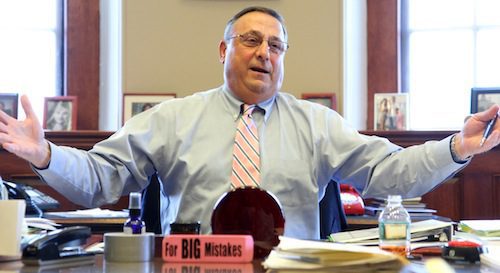AUGUSTA — Gov. Paul LePage is proposing legislation to close a loophole in ethics laws that has allowed high-level state officials not to report millions in state payments to organizations run by themselves or their spouses.
The governor’s legal counsel said the bill was prompted by a Maine Center for Public Interest Reporting story last week that revealed that between 2003 and 2010 the state paid almost $235 million to such organizations.
Dan Billings, who drafted the legislation, said, “This is a reasonable problem that has a reasonable solution. Particularly in the legislative branch where you have a citizens’ legislature, you’re going to have people who have these conflicts, but everybody should know about it and then people can act properly and make sure everybody acts properly and makes decisions accordingly.”
Billings added, “But if you don’t have the information, you can’t do that.”

LePage’s bill, whose lead legislative sponsor is Senate President Kevin Raye, R-Perry, would require legislators, executive branch officials and constitutional officers like the attorney general and secretary of state to disclose if organizations they or family members were affiliated with – as owners or management-level employees – were paid more than $1,000 annually by the state.
Current law only requires that legislators or high-level state employees report state purchases of goods or services worth more than $1,000 directly from the individual legislator or family member, not from a corporation or entity for which the legislator or family member works.
“We’re going to give the legislature an opportunity to correct this,” said Raye. “I’d be very surprised if this doesn’t pass. What would be the rationale?”
Arn Pearson, vice president for programs at Common Cause in Washington, D.C., called the bill “a good step forward, a huge improvement.” But he also said the legislation should be strengthened to require the disclosure of how much state money had gone to personal interests.
“It would be nice if they would take it one step further and disclose the amount and the purpose,” said Pearson. “I think people would want to know that, if you saw this listed on a disclosure form the first question would be, ‘How much and for what?’”
Raye said the bill would only apply to managerial level employees or owners of companies that got state funding or contracts.
“If you’re the janitor at Company X, it doesn’t include you,” he said.
Among those lawmakers whose organizations received millions of dollars in public funding was Sen. Joseph Brannigan, D-Portland, who was chair of the Appropriations and Health and Human Services committees during the period when $98 million in public funding went to Shalom House, where Brannigan was executive director.
Brannigan said Thursday that he backed the governor’s proposal to close the disclosure loophole.
“I fully support the effort to look at and update our disclosure laws,” Brannigan said. “The more transparency the better.”
And the state Senate’s number two Democratic leader, Justin Alfond of Portland, said Thursday he, too, agreed with the move to tighten the loophole.
“Maine is fortunate to attract many working professionals to serve in our part-time, citizens legislature. These lawmakers often run successful businesses and non-profits that sometimes assist Maine people and government,” said Alfond. “Transparency and accountability are paramount in these relationships. I fully support an easy legislative fix as it’s critical to earn and keep the public’s trust.”
LePage’s proposed legislation closes an additional loophole, also documented in the Center’s story, that has allowed departing legislators and officials to ignore the requirement to file financial disclosures each year if the filing deadline falls after they have left office or state employment. That’s created a situation where prominent lawmakers and regulators, such as former Public Utilities Commission head Kurt Adams, did not have to file a financial disclosure for their last year (or portion of a year) in state government.





